Cargando...
Recursos educativos
-
Nivel educativo
-
Competencias
-
Tipología
-
Idioma
-
Tipo de medio
-
Tipo de actividad
-
Destinatarios
-
Tipo de audiencia
-
Creador
-

Final self-evaluation 10.07 - The Baroque Age
EduBook Organización
- 3159 visitas
Choose the correct answer: The veneration of religious images in churches was a feature of... The Baroque introduced new aesthetic values, such as... The most representative figure of Italian Baroque…
-
![Initial evaluation 4. [...] | Recurso educativo 468789](//63890.sevenloophk.tech/uploads/contents/2014/05/06/468789_1399363788_s.png)
Initial evaluation 4. [...]
EduBook Organización
- 3169 visitas
Are the following sentences true or false?: The Reconquest reduced the power of the nobles. The Muslim ruler paid tribute to the Christian kings in an attempt to ensure peace. In the 11th century, the…
-

Globalisation and urban spaces
EduBook Organización
- 3150 visitas
1.1. Transformation of urban spaces Towards the end of the 20th century, the effects of globalisation on urban spaces were starting to show and a new type of city was emerging: the global city. Global…
-

True/false. Main characteristics of the Neolithic period
EduBook Organización
- 3144 visitas
Decide if the following statements are true or false: The Neolithic period began in the South of Europe. ➝ The advances made in the Neolithic period were the cultivation of land and the domestication…
-

Initial evaluation 10.02 - The Baroque Age
EduBook Organización
- 3149 visitas
Are the following statements about the 17th century true or false?: The bourgeoisie increased its influence. The peasants had more political power. In general, the 17th century was a period of growth…
-

True / False. The beginning of the Modern Age
EduBook Organización
- 3117 visitas
Are these sentences true or false? Christopher Columbus's discovery of America in 1492 is considered the beginning of the Modern Age. King Ferdinand and Queen Isabella were called the Catholic…
-

Secondary Schools
V&V Books Vicens Vives Organización
- 2845 visitas
Homophobic, biphobic and transphobic (HBT) language and bullying are widespread in UK secondary schools, affecting young people's well-being as well as their attendance and attainment. Here you…
-

Initial evaluation 02 - The Middle Ages
EduBook Organización
- 3106 visitas
Decide if the following statements are true or false: In the Middle Ages, most people knew how to read and write. ➝ The Muslims conquered the Peninsula and created Al-Andalus. ➝ The Muslims occupied…
-

-

Newton's law of gravitation
EduBook Organización
- 3100 visitas
Basing his work on many different kinds of experiments, the English physicist Sir Isaac Newton (1642 – 1727) established the law of gravitation. The law of gravitation states that the greater the…
Te estamos redirigiendo a la ficha del libro...



![Initial evaluation 4. [...] | Recurso educativo 468789](http://63890.sevenloophk.tech/uploads/contents/2014/05/06/468789_1399363788_s.png)









